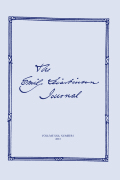
Emily Dickinson Journal
metrics 2024
Unraveling the Mysteries of Dickinson's Literary Artistry
Introduction
Emily Dickinson Journal, published by Johns Hopkins University Press, is a distinguished scholarly periodical that explores the depths of literature and literary theory, with a particular focus on the life and works of the iconic American poet, Emily Dickinson. Since its inception in 2009, the journal has steadily gained recognition within the academic community, achieving a notable Q3 ranking in the 2023 literature and literary theory category, as well as placing in the 72nd percentile among its peers according to Scopus rankings. With an ISSN of 1059-6879 and an E-ISSN of 1096-858X, it serves as an essential resource for researchers, professionals, and students seeking to deepen their understanding of Dickinson's influence on contemporary literature, theory, and the broader cultural context. Although it does not currently offer open access, the journal remains committed to advancing critical discourse around Dickinson's work through peer-reviewed articles, in-depth reviews, and thoughtful essays that illuminate her lasting impact on literary studies.
Metrics 2024
 0.11
0.11 0.20
0.20 0.30
0.30 8
8Metrics History
Rank 2024
Scopus
JCI (Web Of Science)
Quartile History
Similar Journals

GRADIVA
Unveiling the Layers of Literary EvolutionGRADIVA is a distinguished journal published by Casa Editrice Leo S Olschki, focusing on the fields of literature and literary theory. With an ISSN of 0363-8057, this scholarly publication serves as a platform for innovative research and critical discourse within the humanities. Although not currently following an open access model, GRADIVA provides valuable insights into literary studies, encompassing a broad array of topics from classical to contemporary texts. The journal has seen significant evolution, operating from 2002 to 2012 and continuing its legacy from 2017 to 2024. In the 2023 Scopus rankings, it is positioned in the Q4 category, indicating a niche but dedicated place among literature journals, currently ranked at #1055 out of 1106 in the Arts and Humanities field, reflecting its focused yet important contribution to scholarly discussions. Researchers, professionals, and students interested in the intricate interplay of literature and theory are encouraged to engage with this publication, as it remains an essential resource for understanding the dynamics within literary scholarship.
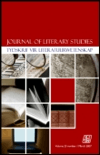
Journal of Literary Studies
Advancing literary discourse through innovative research.Journal of Literary Studies, published by UNISA PRESS, is a premier open access journal dedicated to advancing the field of literature and literary theory. With its ISSN 0256-4718 and E-ISSN 1753-5387, the journal has established itself as a leading platform for innovative research since its inception in 1985, with a notable convergence period running through to 2024. Recognized in the Q1 quartile of literature and literary theory, the journal ranks impressively at #236 out of 1106 in its category according to Scopus, highlighting its impact in the arts and humanities with a percentile rank of 78th. The journal's open access model, adopted in 2022, reflects its commitment to accessibility and dissemination of knowledge globally, making it an essential resource for researchers, academics, and students alike. With an editorial focus on interdisciplinary approaches and contemporary critical discourse, the Journal of Literary Studies serves as a vital vessel for the exchange of ideas and scholarly dialogue in the intricate landscape of literary studies.

Revue Italienne d'Etudes Francaises
Navigating the Intersection of Language, History, and TheoryRevue Italienne d'Etudes Francaises, published by SEMINARIO FILOLOGIA FRANCESE, is a pivotal open access journal dedicated to the exploration and analysis of French studies within the broader context of history, linguistics, and literary theory. Since its inception in 2011, this journal has fostered scholarly dialogue and critical discourse, offering a platform for researchers, professionals, and students alike to disseminate their work and engage with contemporary issues in these fields. With an ISSN and E-ISSN of 2240-7456, the journal has established itself within the academic community, although it currently ranks in the lower quartiles across various disciplines, as indicated by its Scopus metrics. Nevertheless, the Revue Italienne d'Etudes Francaises remains an essential resource for those seeking to deepen their understanding of Francophone literature, culture, and linguistic dynamics from its base in Rome, Italy, at C/O Fondazione Primoli. As the field of French studies continues to evolve, this journal plays an important role in highlighting the latest research findings and theoretical advancements.
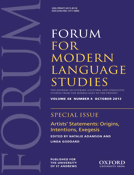
FORUM FOR MODERN LANGUAGE STUDIES
Nurturing Innovation in Language ScholarshipFORUM FOR MODERN LANGUAGE STUDIES is a prestigious academic journal published by Oxford University Press that has been serving the fields of literature and linguistics since its inception in 1965. This journal, with an ISSN of 0015-8518 and an E-ISSN of 1471-6860, plays a crucial role in advancing scholarly discourse on modern language studies, including literature and literary theory. With an impactful presence in both the linguistic and literary domains, it has been recognized in 2023 with a category ranking of Q2 in Literature and Literary Theory and Q3 in Linguistics and Language. It stands out in the competitive landscape, holding a notable position within Scopus rankings, including a 70th percentile ranking in Literature & Literary Theory. While the journal currently does not offer open access options, it remains a vital resource for researchers, educators, and students passionate about the transformative power of language and literature. Its commitment to quality research and robust academic discussion underscores its importance, making it a key platform for those aiming to contribute to modern language scholarship.
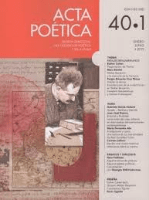
Acta Poetica
Cultivating a Vibrant Community of Literary InquiryActa Poetica is a distinguished open-access journal dedicated to advancing research and scholarship in the fields of Cultural Studies and Literature and Literary Theory. Published by the Universidad Nacional Autónoma de México through its Instituto de Investigaciones Filológicas, this journal has been a pivotal platform for the dissemination of literary discourse since it embraced open access in 1979. With a notable presence in both the social sciences and humanities, Acta Poetica has earned a ranking of Q3 and Q2 in the 2023 category quartiles, reflecting its commitment to quality scholarship. The journal invites contributions from researchers, professionals, and students alike, fostering a rich dialogue that explores the nuances of literary criticism and cultural phenomena. With its ISSN 0185-3082 and E-ISSN 2448-735X, the journal aims to make valuable research accessible to a global audience, continuing its legacy of enhancing literary scholarship from its base in Mexico City.
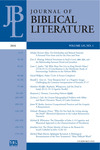
JOURNAL OF BIBLICAL LITERATURE
Advancing Scholarship at the Intersection of Faith and Literature.The JOURNAL OF BIBLICAL LITERATURE, published by the Société Biblique de Littérature, is a premier academic platform dedicated to the interdisciplinary exploration of biblical texts through the lenses of literature and religious studies. With impressive Scopus rankings—placing it in the top 5% of journals in both Literature and Literary Theory as well as Religious Studies—the journal exemplifies quality and rigor in its scholarship. Despite its lack of open-access options, it is highly regarded for its contributions to scholarly discourse, aiming to enrich understanding of biblical literature within both historical and contemporary contexts. The journal operates within the elite Q1 quartile, underscoring its significance in the field and making it an essential resource for researchers, professionals, and students alike. Conveniently based in the United States, at 825 Houston Mill Rd, Suite 350, Atlanta, GA 30329, the journal is poised to continue impacting the scholarly landscape leading into its converged years from 2002 to 2024.

Neo-Victorian Studies
Bridging Eras: Where Past Meets Present in ScholarshipNeo-Victorian Studies, published by Swansea University, is an esteemed interdisciplinary journal that delves into the vibrant cultural phenomena reflective of the Victorian era in contemporary contexts. Launched in 2008 as an Open Access platform, it invites scholars, researchers, and enthusiasts to explore the dynamic relationship between the past and present through critical discussions, innovative research insights, and theoretical frameworks. With a unique focus on the resurgence of Victorian themes and narratives in modern literature, arts, and media, this journal plays a pivotal role in advancing the understanding of neo-Victorianism within academia and beyond. Supported by a commitment to accessibility and scholarly excellence, *Neo-Victorian Studies* fosters an inclusive space for dialogue and discovery, making it an essential resource for those engaged in cultural studies, literature, and interdisciplinary research.

Knjizevna Smotra
Illuminating the Intersection of Culture and LiteratureKnjizevna Smotra, published by FILOZOFSKI FAKULTET in Croatia, is a prominent academic journal dedicated to the fields of Cultural Studies and Literature and Literary Theory. With an ISSN of 0455-0463 and an E-ISSN of 2459-6329, this journal has gained recognition for its commitment to advancing scholarly discourse and critical analysis in the humanities. Notably, it is positioned in the Q2 category for Cultural Studies and the Q1 category for Literature and Literary Theory as of 2023, indicating its significant impact in these disciplines. Despite its current Scopus rankings revealing challenges—such as its position in the 16th and 7th percentiles for literature and cultural studies respectively—Knjizevna Smotra continues to foster an intellectual environment for researchers, professionals, and students to explore and contribute to the ever-evolving landscape of literary criticism and cultural analysis. The journal's converged publication years from 2013 to 2024 signal its enduring relevance and commitment to disseminating impactful research in this dynamic field. Its address in Zagreb reflects its roots in a region rich in cultural and literary heritage, further enhancing its appeal to a global audience seeking to engage with diverse scholarly perspectives.
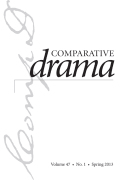
COMPARATIVE DRAMA
Advancing Scholarly Conversations in Comparative TheatreCOMPARATIVE DRAMA is an esteemed journal published by Western Michigan University that examines a broad spectrum of drama across cultures and time periods. With an ISSN of 0010-4078 and an E-ISSN of 1936-1637, this journal serves as a critical platform for researchers, educators, and students in the fields of literature and literary theory. Although classified in the Q3 quartile for 2023, its commitment to scholarly rigor and innovative discourse on comparative drama ensures its relevance in the academic community, garnering attention from a global audience. The journal is particularly valued for its interdisciplinary approach, making it a vital resource for those interested in exploring the interplay between dramatic texts and their cultural, historical, and social contexts. With a strong foundational focus that spans from 2002 to 2024, COMPARATIVE DRAMA continues to engage with contemporary issues surrounding theatrical practice and performance studies, paving the way for new interpretations and scholarly conversations.

Impossibilia-Revista Internacional de Estudios Literarios
Illuminating the Inaccessible in Literary AnalysisImpossibilia-Revista Internacional de Estudios Literarios is a premier open access journal dedicated to the vibrant field of literary studies, published by ASSOC CULTURAL IMPOSSIBILIA since 2011. With its ISSN 2174-2464, this international journal encourages the exploration and analysis of diverse literary theories, texts, and contexts, making it an essential resource for researchers, scholars, and students alike. Hailing from Granada, Spain, Impossibilia not only fosters academic discourse in literature but also promotes intercultural dialogue through its commitment to accessibility and inclusivity. While data such as H-index and Scopus rankings are still to be developed, the journal's focus on enriching the literary landscape ensures its growing impact and relevance within the academic community.